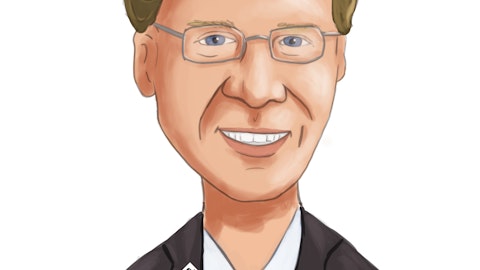WPP plc (NYSE:WPP) Q4 2022 Earnings Call Transcript February 23, 2023
Operator: Good afternoon, ladies and gentlemen, and thank you for standing by. Welcome to WPP Preliminary Financial Results Conference Call and Webcast. . Today’s conference is being recorded. At this time, I would like to hand the conference over to WPP’s CEO, Mr. Mark Read. Please go ahead, sir.
Mark Read: Thank you very much, and good morning, everyone, and welcome to the WPP 2022 preliminary results presentation. As you know, we now do this as more of a Q&A session. We should take the presentation as read. It’s available online, rather than take up your time with that. We thought we could get straight into questions. Maybe I’ll make a few preliminary remarks. I’m here with John Rogers, our CFO. So John and I will take your questions. Look, I think we had a good 2022. We grew 6.9% in the year. A respectable or more than respectable Q4, 6.4%, perhaps somewhat better than we’d expected after a somewhat softer Q3, but that was in part driven by comparatives. But I think the momentum we had for the year carried into Q4, and I think you’ll see some of that momentum carry into next year through our guidance.
We had a very broad-based performance. Our Integrated Agencies is up 6.9%, with a 3-year growth of 9.5%. Strong performance in GroupM, Ogilvy, AKQA, Hogarth. our PR businesses were up 8.2% like-for-like with a strong performance, particularly from Hill+Knowlton, and our Specialist Agencies is up 5.6%. So functionally, we grew strongly across all our functions. And regionally as well, North America, up 6.6%, U.K. up 7.6%. I’ve called out particularly resilient Western Continental Europe at 5.5% and Asia Pacific, rest of the world, up 8% last year. So a broad-based performance across services and regions, a strong competitive performance from leading at Cannes to a new business number close to $6 billion. We continue to invest in the business.
And we talked a lot on the call about the impact of AI on our industry mix against the fundamentals. Our transformation savings are ahead of plan, and we’re on track to deliver the GBP 70 million of savings by 2025. And then lastly, our guidance. So our guidance for like-for-like revenue of passing cost is 3% to 5%, and headline operating margin of around 15%. And I think that’s based on conversations that we have with clients, what they’re telling us, what they intend to spend for the year, really driven by their continued desire to invest in their business and invest in brands. I think in part also driven by the complexity of the environment and the new media opportunities available to them on platforms like Netflix and TikTok and retail media platforms, as well as the transformation in WPP’s business and expansion we’ve made in new areas around data, technology and e-commerce.

Photo by Zane Lee on Unsplash
So in short, I think we had a good year. We’re going into this year, I would say, confident in our guidance. It is a little bit softer than 2022, but I think that’s what one would expect. And it’s significantly ahead of analyst expectations certainly at the end of last year. So with that as an introduction, why don’t we open it up for questions. And John and I will take those as people have them.
Operator: . We will now take our question from Tim Nollen from Macquarie.
Timothy Nollen: I did read the transcript from your meeting this morning in London, and I noticed a lot of very specific detailed numbers questions. So I’ll spare you those this time and ask you instead two much broader, big-picture question. Firstly, Mark, you did mention AI and ChatGPT in your opening remarks. And I wanted to follow up on that and ask. I understand the role of these generative search functions in terms of creating ad copy and so forth. But my question is more, how might the search market change if Bing is to gain share over Google given these changes in search? And how might that affect ad spending in general, given how big search is in terms of total advertising spending? I wonder if we’re at the cusp of the sea change and much more than just who wins the search wars, but how this might change the overall ad market, if that’s not too dramatic a statement. Maybe let’s go with that and then I’ll ask my second question, if that’s okay.
Mark Read: Yes. Look, I think that it’s too early to say. But if we had to hesitate a view we discussed it a lot internally is — I think people go to search for a number of reasons, don’t they? And some of those — most of those reasons is to answer direct questions or to find out information or to book a claim ticket or find a holiday destiny– there’s many, many reasons people go to search. And you sometimes get vertical search engine. So Amazon have carved off a portion of search around sort of some subsegment of products. And sometimes you might go in search in Twitter to see what’s happened in the last 5 minutes that hasn’t happened in — that wouldn’t be on Google in that period of time. So I don’t think that — certainly, what I’ve seen from some of these generative AI engines is going to, by any means, replace like 100% or match 100% of what Google does, nor is it going to necessarily lead to a better answer.
I asked it to write my bio and it came out with quite a large number of factual inaccuracies, upgraded my university, et cetera, et cetera. So that’s not to say that it won’t have significant changes over time. But I don’t think there’s going to be a dramatic shift in a very short period of time in what goes on in search. So as the engines get better and as they understand what’s true and not true, and the question is, can they understand what’s true and not true, we’ll see different impacts. But I don’t think that there’s a sort of — there’s so many different segmentations of search and questions you get through that search query box. I think it’s hard to say that suddenly in every category, one search engine versus another is going to be particularly more impactful.
And I think all of the major technology comes investing significantly in AI. So I think we have to sort of wait to see. Now from our perspective, it sort of really doesn’t matter which one does better or worse. So I don’t think it impacts WPP directly. If anything, more competition is better for us and better for our clients. So that’s kind of how — I think we’ve talked about it.
See also 12 High Growth Penny Stocks that are Profitable and 12 Most Promising Future Stocks to Buy.
Q&A Session
Follow Wassau Paper (2016) (NYSE:WPP)
Follow Wassau Paper (2016) (NYSE:WPP)
Receive real-time insider trading and news alerts
Timothy Nollen: Right. Maybe the last point is what I’m getting at, if it is — if it does open up the search market, more participants, more activity for you. Okay, that’s interesting. My second question is about the ad tech market, and we’ve been reading a lot about the ties that GroupM has been making with the SSPs like PubMatic and Magnite, and Magnite spoke last night on their call about expanding those relationships with GroupM as well as some other media buyers. So my question is, do you think we are getting toward a more efficient ad tech market, which should in turn be better for advertising clients? And also, it seems better for WPP and the agencies, given that your role seems to be more deeply tied into all these technology enhancements.
And it’s quite counter to the concerns of a few years ago that ad tech was going to disrupt the agencies as concerned a lot of people had. Now it almost seems like the role of agency is even more essential, more embedded into the process. So any comments you could give around that would be great, too.
Mark Read: Yes. Look, I mean, I’ve always been — and I think we’ve always been consistently of the view that much of this technology, if we embrace it properly, will help us grow, not dis-intermediate us. So I would agree there. And I think on the ad tech point, look — it looks like the estimates I’ve seen of sort of the amount of money lost, the so-called ad tech tax is decreasing, which is what you’d expect as the market gets bigger and more efficient. And what in one year is a new product becomes much more of a commodity. And I expect that to continue. And that’s good for advertisers. It means that more of the money they invest goes in producing content. So I think broadly speaking, it’s a positive development.
Operator: . Our next question comes from Michael Nathanson from MoffettNathanson.
Michael Nathanson: My question is a bit more prosaic, so I apologize. The question we’re struggling with is, trying to trying to figure out normalized cash flow, right? You have all these pieces, which we understand, working capital, which we’ve been through the on this. But how do you think about just normalized maybe cash conversion when the business gets to a steady state, right? So help us understand kind of where this business should generate cash as a percentage of EBITDA, if possible. And then one of the things we’re really struggling with is kind of the impact of foreign exchange, clearly in the U.S., for the U.S. based agencies on margin and whether or not it’s a help or a hindrance. But you have a commentary on margin guidance headline, but FX is kind of neutralized. How do you help us with just the wide volatility in FX? And what does it do to your business on a reported basis on margin?
Mark Read: Yes. John, why don’t you tackle both of those?
John Rogers: Just on the ForEx one. Look, the reality is that actually, we’re reasonably well, if you like operationally hedged on margin because obviously, most of our cost base is also in the same currency as where we bill. So in the main, we are pretty well hedged. So even though there may be swings on the net sales line, vis-a-vis in terms of margin, it generally doesn’t have a huge impact. I mean, obviously, we’re slightly more centered in terms of our cost base in the U.K. because we’re sort of the U.K. — more sort of a U.K. headquartered business. But generally speaking, I mean, say for example in 2023 we would, I think at the moment, we say it’s margin neutral even though there’s a slight tailwind from, sort of, currency on the top line.





